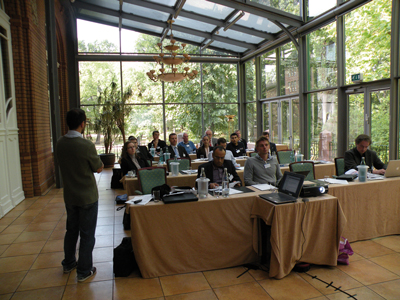by Erwin Schoitsch
Following a tradition since 2006, the ERCIM Working Group on Dependable Embedded Systems and EWICS organized again a full day workshop during the annual SAFECOM conference.
SAFECOMP is nowadays an established international conference in the field of Computer Safety, Reliability and Security. The 31st International SAFECOMP Conference took place in Magdeburg, Germany, on 25-28 September, 2012. About 150 participants attended this year’s conference. SAFECOMP has contributed to the progress of the state-of-the-art in dependable application of computers in safety-related and safety-critical systems since it was established in 1979 by EWICS TC7, the European Workshop on Industrial Computer Systems, TC7, Reliability, Safety and Security.

Workshop participants
Partners from ERCIM, EWICS (European Workshop on Industrial Computer Systems Reliability, Safety and Security), from several EU-Framework and ARTEMIS (European Embedded Computing Systems Initiative) projects atttended the conference and the associated workshops, and reported on related subjects.
TheERCIM / EWICS / Embedded (Cyber-Physical) Systems Workshop workshop was jointly co-organised by the ARTEMIS projects MBAT (Combined Model-based Analysis and Testing of Embedded System), SafeCer (Safety Certification of Software-Intensive Systems with Reusable Components) and R3-COP (Resilient Reasoning Robotic Co-operating Systems). To be distinct from the SAFECOMP conference mainstream, the workshop accepted reports on “work in progress” aiming at fruitful discussions and experience exchange. Reports on European or national research projects (as part of the required dissemination) as well as industrial experience reports were welcome.
Although there were five workshops and one tutorial in parallel, 18 registered and two partially attending participants listened to the Cyber-physical Systems Workshop and took part in the intensive discussions.
The workshp was composed of six sessions:
- Introduction: ERCIM, EWICS, ARTEMIS: Embedded Systems Safety, Security and European Strategy (providing an overview over ERCIM, EWICS, MBAT, SafeCer and R3-COP)
- Dependable Embedded Systems Applications
- Secure Systems – Systems Security
- Validation, Verification and Qualification
- Systems Safety and Trust
- Ambient Assisted Living.
Three embedded systems applications were presented in the first session of the workshop: one paper discussed the elaboration of safety requirements in the avionic domain (by EADS, an industrial paper), the second paper presented the ARTEMIS robotics/ autonomous systems research project R3-COP, focussing on the knowledge-based approach to compose robotic applications and tool chains for V&V from a collection of building blocks in ontology-driven data bases, which is considered as basis for a reference technology platform for robotics and autonomous systems, as developed by AIT Austrian Institute of Technology, DTI Danish Technology Institute, tecnalia Spain, TU Brno, Czech Republic and other R3-COP partners.
The session on system security included three presentations looking at different aspects of secure systems. “On the Design of Secure Time-Triggered Systems” focussed on a novel joint safety and security architecture for dependable time-triggered systems, adding the security aspects to the already well-studied and proven time-triggered system architecture (by AIT, TU Vienna, Austrian Academy of Sciences and TTTech).
Todays’ and evolving cyber-physical systems (CPS) have as typical feature wide-spread distribution of nodes. In the presentation of the work of pSHIELD, another ARTEMIS project, by SESM (Italy) and the Polytechnic Institute of Coimbra (Portugal), an architecture framework was demonstrated supporting security, privacy and dependability as a built-in feature in a network of embedded nodes, improving also re-use of already verified embedded components and systems. The “Cyber-Physical Attacker”, developed by Technical University of Denmark (DTU), models attacker scenarios addressing the peculiarities of a cyber-physical adversary, which allows the security properties of a CPS to be studied.
Validation, verification and qualification are issues of great importance when trying to prove trust in CPS. The NuSMV model checker is well known in the formal methods community. The first paper in this session presented an interesting extension to NuSMV, Parallel NuSMV, which was presented by ALES S.r.l. from Italy as part of the FormalSpecs Verifier Framework for the formal verification of complex embedded systems, using Simulink/ Stateflow models.
One of the ideas to considerably improve and speed up development of safety-critical embedded systems is the use of tool chains, which implies seamless integration of different tools to cover significant parts of the development life cycle. Safety standards require qualification of tools, but are not looking in-depth into the issue of integration of pre-qualified tools into tool-chains. The paper on “Automated Qualification of Tool Chain Design” from KTH (Sweden) presented a promising approach to reduce effort in qualifying tool chains by automatically analysing a tool chain model for safety issues acknowledging the MBAT project. The last paper of this session was on a model-based development approach for the design and validation of electronic control systems by simulation, using a Data Time Flow Simulator, developed by AIT in the context of the ARTEMIS project POLLUX which tackles problems on the design of the next generation of electric cars.
A topic always crucial in the context of safety-critical systems is how to achieve and prove trust in such systems. One issue in these systems is predictability, essentially in the time domain. Compiling for time predictability is one approach to generate code which has a predictable timing behaviour even in the case of complex processors. Within the T-CREST project, the University of Technology of Vienna and the University of Hertfordshire (and others) worked on HW/SW architectures and code-generation strategies to achieve time-predictability, explaining the single-path code generation process in their paper. In the NOR-STA project, the University of Gdansk addressed development, maintenance and assessment of structured, evidence-based arguments to support trust assurance in CPS, using the TRUST-IT methodology and presenting the adequate tool support in the NOR-STA platform of software services available on internet.
In the last session NTNU (Norwegian University of Technology) presented a third application and implementation: an experience with a low-cost AAL monitoring system to enable elderly people a longer and safer stay at home.
The SAFECOMP proceedings are published by SPRINGER in the LNCS series no. 7612.
Link: http://www-e.uni-magdeburg.de/safecomp/about-sc-2012/workshops/103-ercim-cps
Please contact:
Erwin Schoitsch
chair of the ERCIM Working Group on Dependable Software-Intensive Systems
AIT Austrian Institute of Technology / AARIT, Austria
E-mail:











